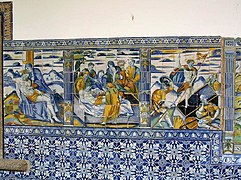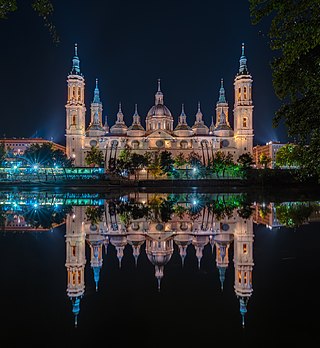
Soria is a municipality and a Spanish city, located on the Douro river in the east of the autonomous community of Castile and León and capital of the province of Soria. Its population is 38,881, 43.7% of the provincial population. The municipality has a surface area of 271,77 km2, with a density of 144.97 inhabitants/km2. Situated at about 1065 metres above sea level, Soria is the second highest provincial capital in Spain.
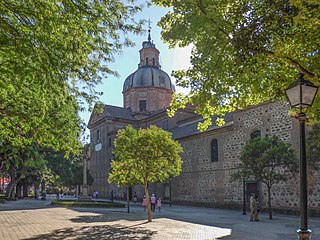
Talavera de la Reina is a city and municipality of Spain, part of the autonomous community of Castile–La Mancha. Its population of 83,303 makes it the second most populated municipality of the province of Toledo and the fourth largest in the region.

The Paseo del Prado is one of the main boulevards in Madrid, Spain. It runs north–south between the Plaza de Cibeles and the Plaza del Emperador Carlos V, with the Plaza de Cánovas del Castillo lying approximately in the middle. The Paseo del Prado forms the southern end of the city's central axis. It enjoys the status of Bien de Interés Cultural (BIC), and as part of a combined UNESCO World Heritage Site with Buen Retiro Park.

Azulejo ; from the Arabic al-zillīj, الزليج) is a form of Portuguese and Spanish painted tin-glazed ceramic tilework. Azulejos are found on the interior and exterior of churches, palaces, ordinary houses, schools, and nowadays, restaurants, bars and even railways or subway stations. They are an ornamental art form, but also had a specific functional capacity like temperature control in homes.

El Puente del Arzobispo is a municipality of Spain located in the province of Toledo, Castilla–La Mancha. The municipality spans across a total area of 0.98 km2 and, as of 1 January 2020, it has a registered population of 1,225. Together with neighbouring Talavera de la Reina, El Puente del Arzobispo was a producing centre of Maiolica pottery in Early-Modern Spain.
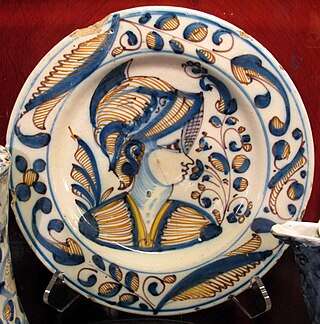
Talavera de la Reina pottery is a traditional type of faience, or tin-glazed earthenware made in Talavera de la Reina, Toledo (Spain). The area has a long history of pottery, and dishes, jars, ceramics and other objects have been found in recent archaeological excavations. Some of the materials discovered date back to the Roman Empire.

The Basilica of la Asunción de Nuestra Señora is a gothic basilica located in Colmenar Viejo, Spain. It was declared Bien de Interés Cultural in 1997.

Albelda de Iregua is a village and municipality in the province and autonomous community of La Rioja, Spain. The municipality covers an area of 23.03 square kilometres (8.89 sq mi) and as of 2011 had a population of 3339 people.

The Monastery of Nuestra Señora del Prado is a monastery located in Valladolid, Spain. It was declared Bien de Interés Cultural in 1877.
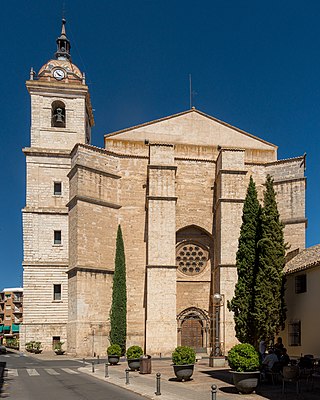
The Holy Priory Church Cathedral Basilica of the Military Order of Our Lady Saint Mary of the Prado of Ciudad Real is located in Ciudad Real, Autonomous region of Castile-La Mancha, Spain. Construction began in the 15th century in Gothic style, although it has elements of late Romanesque, Renaissance and Baroque styles; it has undergone many restorations with the first remodelling credited to Alfonso X since the Romanesque period. It was completed in the mid 16th century after construction of the roof vaults. The tower was built in the early 19th century. The structure is a monument indexed in the Spanish heritage register of Bien de Interés Cultural under the reference RI-51-0000514.

Convent of Santa Fe is a former monastery situated in Toledo, Spain. It is situated in the north-east of the historic centre of the city. Included in the heritage listing Bien de Interés Cultural, it has been protected since 30 September 1919.

The Colegio de Nuestra Señora de los Infantes is a school in the city of Toledo. It was founded in the 16th century by Juan Martínez Silíceo, Archbishop of Toledo and later a cardinal, and was intended to provide a specialist musical education for the cathedral's young singers.

Talavera de la Reina railway station is a railway station serving the Spanish city of Talavera de la Reina, in the province of Toledo.

The Church of Santa María la Mayor is a Roman Catholic church in Talavera de la Reina. It is known as colegiata de Santa María, as it was a collegiate church from 1211 to 1851.

The Basílica de Nuestra Señora del Perpetuo Socorro is a Catholic Church located in the comuna of Santiago, in the capital of Chile. It was designed in the Gothic Revival style by the religious architects Gustave Knockaert —known as «Brother Gerardo»— and Huberto Boulangeot. They were members of the Redemptorists.


